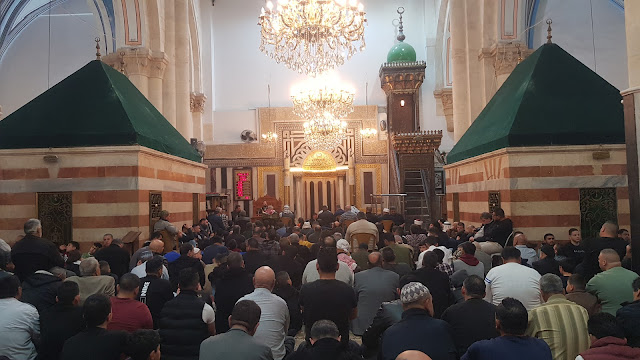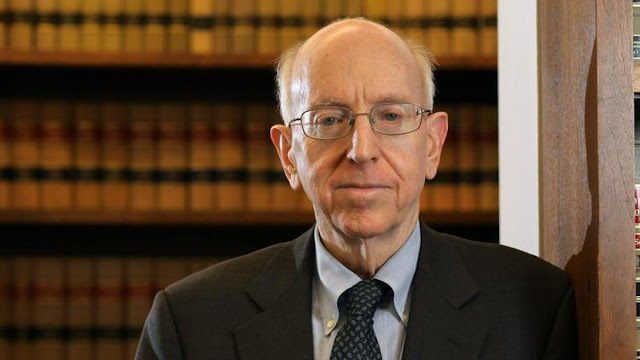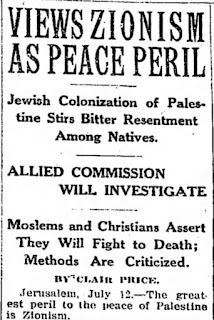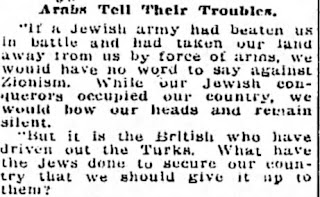By Daled Amos
So just how did Gazans feel about Israel in 2006?
Earlier this year, I posted about an odd statement by former Secretary of State Condoleezza Rice in 2006, when she claimed that
you can look at any opinion poll in the Palestinian territories and 70 percent of the people will say they're perfectly ready to live side by side with Israel because they just want to live in peace.
The problem was that she could not point to an actual poll that supported her claim and if anything, it seemed that polls indicated the opposite.
The year 2006 is an interesting point in the Middle East timeline, because the Palestinian legislative elections were held on January 25 of that year and Hamas won a decisive victory in Gaza over Fatah.
Gallup published a poll on January 27, 2006 based on interviews conducted in "the West Bank", the Gaza Strip, and "East Jerusalem" from December 6, 2005 through January 8, 2006. According to Gallup, the Hamas victory did not indicate a rejection of the peace process, nor did it reflect a desire to attack Israel. Hamas won because of Palestinian Arabs were tired of Fatah corruption.
This analysis was based in part on the following findings:
o The majority of Palestinians think the cease-fire with Israel should be extended in 2006 if both sides agree to it (51%). Only 34% would not extend it.
o Nearly two-thirds of Palestinians say they support the peace process with the Israelis: 26% strongly support it and 39% moderately support it; only 30% oppose it. Current views on this are similar to where they stood six years ago.
o When asked which approach to achieving self-determination for their people they prefer, the majority (54%) favors "mostly nonviolent forms of resistance and negotiation"; only half as many (28%) favor "mostly armed struggle and military solutions." [emphasis added]
This corroborates an article by the Palestinian human rights activist Bassem Eid, who recently wrote about the general, albeit declining, Palestinian support for peace with Israel:
As recently as 2006, polling showed that the majority of Palestinians support peace with Israel and recognize the Jewish state. Even after the violence of the last few years, 39% of Palestinians support a two-state solution as of 2022. Tens of thousands of Palestinians work in Israel and suffer economic harm when BDS radicals implement broad boycotts.
Eid is referring to a 2006 poll by the Palestinian Center for Public Opinion (PCPO), referenced in an article in AsiaNews. PCPO's last poll was done last year in April and the site does not seem to have its polls going back to 2006. However, IMRA does have the text of the poll in its entirety.
AsiaNews summarizes the findings vis-a-vis Israel:
The survey indicates that 50.8 per cent of Palestinians agree to the recognition of the State of Israel, 69.8 per cent are in favour of the resumption of the negotiations with Israel, 62.2 per cent want rocket attacks against Israeli territory to stop, and 80.4 per cent want the truce to continue. [emphasis added]
Clearly, at the very start of Hamas rule, there were indications of a desire for peace both in Gaza and in the West Bank.
This seems to be further supported by the Palestinian Center for Policy and Survey Research (PSR) in a poll they conducted from March 16 to March 18, 2006. The poll notes that Western opposition to Hamas and its victory in the election has not lessened its support among Palestinians -- but the key point is that the increased support for Hamas did not translate into an increased support for the terrorist groups views on the peace process.
On the contrary:
o Despite Hamas’ electoral victory and its increased popularity after the elections, public support for the peace process rose. Public willingness to compromise increased significantly with about three quarters of the Palestinians wanting Hamas to conduct peace negotiations with Israel and only 22% opposing it.
o A majority of 64% says it supports the peace process while only 14% says it is opposed to it. These percentages stood at 59% and 17% respectively in our exit poll on the day of elections last January.
o 66% said they would support, and 32% would oppose, the recognition of Israel as the state for the Jewish people in the context of peace based on a two-state solution and an Israeli recognition of Palestine as the state for the Palestinian people. Support for this solution to the Palestinian-Israeli conflict stood at 57% and opposition at 41% last December. On the day of elections, only 49% supported this solution and 48% opposed it.
o As in the December poll, three quarters would support reconciliation between the two peoples under conditions of peace and the establishment of a Palestinian state recognized by Israel.
But in their very next survey, conducted from June 15 - 18, 2006, PSR already noted a change:
Findings also indicate a decline in the level of short term and long term optimism and an increase in threat perception. Support for armed attacks against Israeli civilians continues to rise. In fact, findings show that support for bombing attacks has more than doubled compared to the situation nine months ago. This development is also reflected in the continued decrease in the level of support for a permanent status agreement along the lines of the Clinton Parameters and the Geneva Initiative. This decrease was first detected in the aftermath of the Sharon’s unilateral disengagement from the Gaza Strip. [emphasis added]
despite the criticism of the performance of the government, two thirds of the public does not believe that Hamas should recognize Israel as required by the international donor community. This view does not reflect a hardening of public attitude toward the two-state solution. Rather it reflects public rejection of recognition of Israel as a precondition for negotiations.
2006 was also the year of the Lebanese War between Hezbollah and Israel, and Palestinian Arabs learned a lesson from that too. According to the PSR poll in September, a majority saw Hezbollah as the victors. This led to the conclusion:
63% agree that Palestinians should use the same methods as Hezbollah such as the launching of rockets at Israeli cities
Hamas leaders in particular took this lesson to heart.
Over time, whatever opportunities may have existed for peace were lost, due in large part by Palestinian leaders that clearly did not share the attitudes, regardless how wary, of their people.
|
Or order from your favorite bookseller, using ISBN 9798985708424. Read all about it here! |

|

 Elder of Ziyon
Elder of Ziyon


































.jpg)



